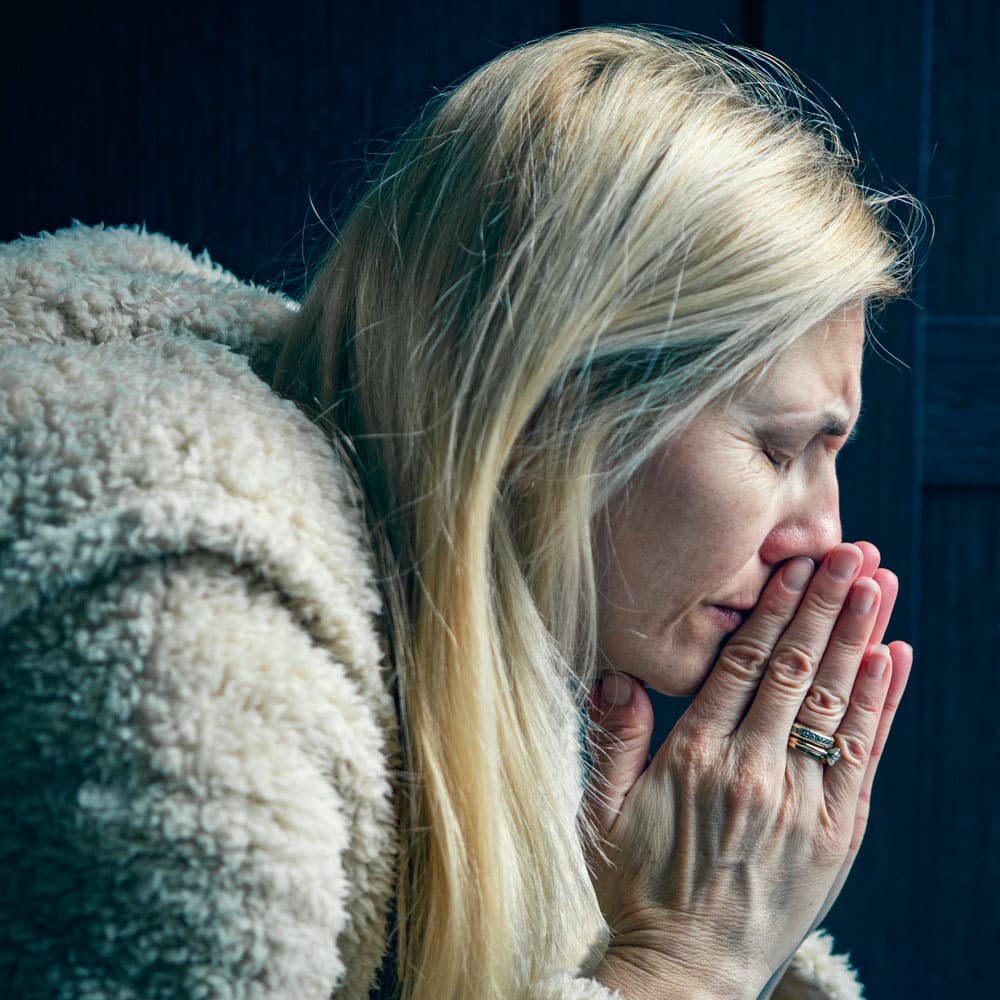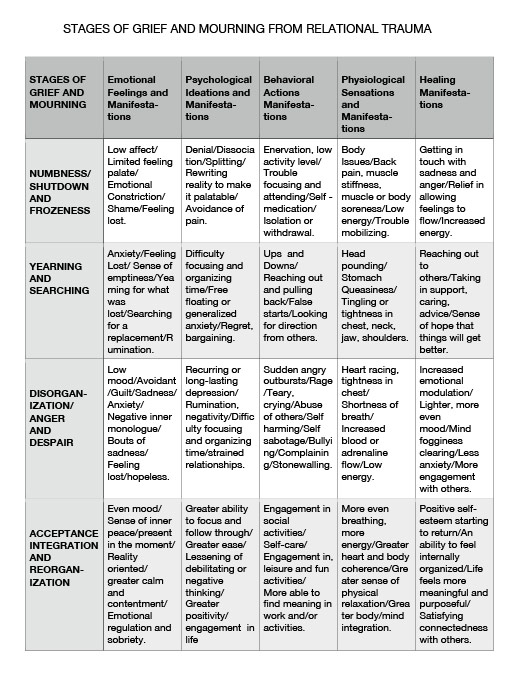“Your pain is the breaking of the shell that encloses your understanding and could you keep your heart in wonder at the daily miracles of your life, your pain would not seem less wondrous than your joy; much of your pain is self-chosen. It is the bitter potion by which the physician within you heals your sick self…”
An excerpt from The Prophet by Kahlil Gibran
There are many types of loss that we encounter in life. Many people navigate the grieving process in ways that are considered normal with feelings of pain, sadness, and sorrow. Traditional grief rituals typically follow these feelings.
When these physical and emotional reactions become more severe might be a sign that someone is experiencing unresolved grief. They often believe there is no end to their pain and suffering, and no one understands what they’re going through.
Grief can evolve into many positive things. Understanding the stages of grief and loss and learning how to process grief to reach complete healing is necessary.
What Is Unresolved Grief?
Unresolved grief is a more complex form that typically lasts longer, sometimes up to a few years. This type of grief is also more intense and severe, often worsening over time. Usually, it interferes with an individual’s ability to function normally in everyday life. Unresolved grief leaves people feeling “incomplete” after a loss. It can mask and reveal itself in various and surprising ways. Understanding how it can manifest helps us trace the source of confusing emotions and outbursts to evaluate our triggers.
At first, it’s challenging to decipher normal from unresolved grief. However, specific symptoms can emerge to determine whether you or someone you know is struggling with unresolved grief. It typically presents itself in people who have low self-esteem, feel guilty about the loss, or struggle with feelings about the deceased.
Some signs of unresolved grief include:
- Sudden angry outbursts
- Rage
- Excessive rumination
- Chronic negativity
- Being easily triggered or having overly intense emotional reactions
- Recurring or long-lasting depression
- Chronic anxiety
- Self-mutilation and self-harming
- Caretaking behavior
- Excessive guilt
- Constant crying or feeling weepy
- Low mood levels or sadness
- Emotional numbness or constriction
- Shame
- Codependency
- Body issues or health-related soreness and stiffness
- A desire to self-medicate
It can also affect those who have experienced an unexpected, violent, or unrecognizable loss. Other risk factors include high stress, lack of social support, trauma, and caregiving to the deceased person. In most cases, people with unresolved grief deny or avoid it. They hold onto their loved ones and refuse to accept the loss, hindering the healing process.
Grieving an Addict
Grief and addiction pose a unique set of challenges. Losing someone to addiction can be particularly confusing. They tend to lack a clear beginning and end, and they’re cumulative. Death is something we can understand. As painful as it might be, we know that we have to accept the reality of it.
We lose an addict repeatedly to their substance abuse, causing us to suffer a rupture over and over again. We continue to hope and trust, but our trust is violated. As a result, we’re left disappointed again. This is much more complicated than losing someone once, and the feelings that accompany this type of loss aren’t simple.

We might feel guilty for what we could’ve done or didn’t do. We may feel survivor’s guilt, wondering why we’re okay when they aren’t. We resent, withdraw, or hate while simultaneously yearning for something that could never fully happen.
When we love an addict, we lose access to parts of them and ourselves. We disconnect with the elements of us that hurt. We freeze, self-protect, and avoid. Part of our inner world shuts down, and this cycle continues repeatedly.
Relational trauma needs to be grieved, but that can be easier said than done. Often, what hurts us most is what we hide from. If we don’t heal from our trauma, we can have trouble embracing a more peaceful and positive future. We stay stuck in the past—a period in our lives that hurt us the most. As a result, we can’t bear to “go there” again. So, we don’t.
Our grief hangs lost and frozen in space, and a part of us is, too. When we can’t mourn these types of losses in real time, we’re left feeling haunted by thoughts and emotions that we don’t know how to manage. If we don’t do something to work through them, they remain with us. Untethered to time and place, they float around like unwelcome intruders.
Disenfranchised Losses
The stages of grief and loss bring different feelings—anger, rage, sorrow, yearning, desperation, loneliness, and even ecstasy. Perhaps this is why grieving is so liberating. It springs us loose from feeling trapped in our own unprocessed emotions and puts us in touch with our deeper essence.
The stages of grief and loss bring different feelings—anger, rage, sorrow, yearning, desperation, loneliness, and even ecstasy.
Some losses, such as death, are evident. Society recognizes them as significant, and we have rituals of mourning them. We feel free to ask for support, and more often, it comes our way without even having to ask. However, the types of losses surrounding relational trauma and addiction aren’t necessarily acknowledged. Therefore, they don’t get grieved. As a result, they often remain disenfranchised.
Disenfranchised losses can lack visibility and clarity. They can be unseen or misread by others—even by ourselves. There might be confusion surrounding who or what has been lost, if there’s even loss at all. The loss can feel invisible, causing essential parts of us to feel the same way. These losses remain buried and unrecognized and can create blocks in our grieving process and recovery. These types of losses need our compassion and care. Grieving these losses can lead to change on the inside and outside. Some examples of disenfranchised losses include:
- Loss of a connection to self as a result of trauma
- Grieving the inner child who lives inside the adult
- The loss of potential or a part of an addict’s life
- The loss of a sober parent or a period of unencumbered childhood
- The loss of a functional family
- The loss of a trusted and dependable partner
- Divorce abandonment or visitation changes
- Socially stigmatized deaths (AIDS, suicide, murder, DUI, or overdose)
- Adoption — either being adopted or placing a child up for adoption, adoptive parents whose child seeks a biological family
- Death of a pet
- Miscarriage or infertility
- Disabling conditions or health issues
- Moving to a new home, job loss, or retirement
- Mental illness or cognitive deficit
Treating Unresolved Grief Through Psychodrama
Our inner world needs to be made manifest to relieve ourselves of the weight of unprocessed emotions. Psychodrama allows for the full and cathartic expression of our feelings. Role-playing lets us travel to the time and place where it happened and express our sadness or anger to the person it’s directed toward.
One issue with unresolved grief is that it can be related to an event from the past intruding on our present. However, this makes it challenging to address because we worry that we should be over it. We also fear that addressing it with someone who might be sober now will undermine our current relationship. If it’s part of our childhood self that we need to talk to, we feel embarrassed or too vulnerable. Again, we presently ignore our wounded parts the same way we were dismissed as a child in the past.
Psychodrama makes this type of dynamic clearer than words ever could. Through surrogates, it takes you directly to the moment in time where a painful complex was set up and creates an in vivo, real-time interaction to revisit, relive, and release.
Imagine that a client has been sharing what she carries about her father from the past but is only marginally aware of.
I might say, “Would you like to choose someone to play your sober dad today? We’ll keep Dad and your current relationship with him over here safe. Now, choose someone to play Dad when he was drunk, high, or abusive, so you can deal with that part of him who’s still living inside of you today, okay? I promise we won’t tell Dad you’re doing this. It’s just for you so that you can heal.”
I try to reassure her that we won’t touch what’s working and that she’s fully entitled to protect the dad she’s so close to now. Then, we can deal with the dad she had in childhood to heal her “inner child,” her “inner adolescent,” or whatever inner part of her needs attention and is still carrying pain from the past—either in a shutdown state or as hypervigilance, anxiety, or depression.
Navigating the stages of grief and loss is challenging. However, clients aren’t going there alone. The group and I are with them to support, help, and keep things safe.
Navigating the stages of grief and loss is challenging. However, clients aren’t going there alone. The group and I are with them to support, help, and keep things safe.
The Benefits of Letter-Writing
One way to approximate this experience is to write a letter that isn’t to be sent to anyone. This letter can be to the part of yourself, another person, a time in your life, or a circumstance that you’re saying goodbye to, grieving for, or want to work with. When you write it for your eyes only, you can fully express your feelings and say everything you need or long to say.
Let the paper listen to you, and let yourself talk. You might be surprised at how cathartic it feels. Once you finish the letter, you can decide what to do with it. If you want to share it in therapy or with a trusted friend or support group, you can. You can also ritualize the letting process by burying it in nature, putting it in a particular place, or tearing it up. It’s simply a vehicle for self-expression and not written to be sent to anyone at all.
Grief Workshops at The Meadows
Mending Heartwounds at Rio Retreat Center provides tools for coping with grief and allows you to feel safe and supported as you move through it. Sharing these parts of ourselves that we’ve relegated to inner silence is an essential part of healing them. It opens those parts of our inner world that might be mistrustful of deep and trusting connections to reconnection—both with ourselves and others. It’s a liberating process that releases energy that we can now use as we wish. This process is relieving and renewing.
This chart gives you an overview of how unresolved grief may manifest in our thinking, feelings, and behavior.

Partially excerpted from The Soulful Journey of Recovery, © Tian Dayton, 2019, Health Communications. “The Stages of Grief and Mourning from Relational Trauma” reprinted from The Soulful Journey of Recovery. Permission to reproduce is granted with these acknowledgments.

